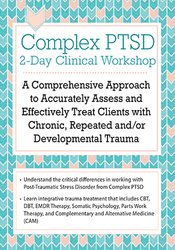

Many clinicians are trained in the treatment of single traumatic events, but are not fully equipment to treat Complex PTSD. The traditional approaches to the treatment of PTSD can fall short when working with clients with Complex PTSD. Watch this recording to learn how you can adapt your therapeutic approach to help clients diagnosed with Complex PTSD achieve more successful outcomes.
The most common question asked when treating Complex PTSD is, “where do I start?”. In this training, you will develop confidence in your ability to successfully organize and prioritize your client’s treatment goals. You will learn how to compassionately and effectively work with clients who have experienced multiple traumatic events and prolonged trauma exposure.
Successful treatment requires a compassionate therapeutic relationship and effective, research-based interventions. After this two-day workshop you will learn how to:
In this recording, Dr. Arielle Schwartz will show you an engaging and interactive way to learn valuable strategies that will allow you to successfully address the dysregulated affect and arousal states that accompany Complex PTSD. You will leave this seminar with practical tools that facilitate a strength-based approach to trauma recovery and increased resilience in clients.
This online program is worth 12.25 hours CPD.
| File type | File name | Number of pages | |
|---|---|---|---|
| Manual - Complex PTSD 2-Day Clinical Workshop (2.33 MB) | 96 Pages | Available after Purchase |

Arielle Schwartz, PhD, CCTP-II, E-RYT, is a clinical psychologist, internationally sought-out teacher, therapeutic yoga instructor, and leading voice in the healing of PTSD and complex trauma. She is the author of six books based upon her integrative, mind-body approach to trauma recovery: The Complex PTSD Workbook; The Post Traumatic Growth Guidebook; A Practical Guide to Complex PTSD; EMDR Therapy and Somatic Psychology; The Complex PTSD Treatment Manual, and Therapeutic Yoga for Trauma Recovery. Her unique blend of spirituality and science can be found in her writings, guided trauma recovery programs, and applied Polyvagal Theory in yoga for trauma recovery.
Dr. Schwartz is an accomplished teacher who guides therapists in the application of EMDR, somatic psychology, parts work therapy, and mindfulness-based interventions for the treatment of trauma and complex trauma. She has a succinct way of speaking about very complex topics. She is a longtime meditation and yoga practitioner with a passion for the outdoors; all of which she incorporates into her work as founder of the Center for Resilience Informed Therapy in Boulder, Colorado where she maintains a private practice providing psychotherapy, supervision, and consultation. Dr. Schwartz believes that the journey of trauma recovery is an awakening of the spiritual heart. Discover more at drarielleschwartz.com.
Speaker Disclosures:
Please Note: PESI is not affiliated or associated with Marsha M. Linehan, PhD, ABPP, or her organizations.
| 5 |
|
| 4 |
|
| 3 |
|
| 2 |
|
| 1 |
|
Satisfaction Guarantee
Your satisfaction is our goal and our guarantee. Concerns should be addressed to info@pesi.co.uk or call 01235847393.
Please wait ...